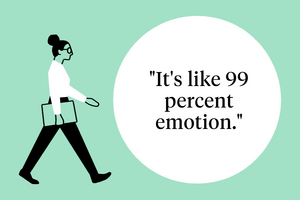Careers Aug 21, 2020
3 Tips for Conquering Self-Doubt at Work
High achievers often worry they aren’t qualified to weigh in. Here’s how to get past those self-sabotaging thoughts.
This audio is powered by Spokn.

Yevgenia Nayberg
At some point or another in our careers, pretty much everyone needs to overcome self-doubt.
Ironically, feelings of self-doubt can be particularly acute for high achievers, who may hold a nagging suspicion that they aren’t ready for the positions into which they have been promoted. And while a dose of humility can be a helpful guard against hubris, too much self-doubt can lead to paralyzing indecisiveness.
Ellen Taaffe, a clinical assistant professor of leadership and director of women’s leadership programs at the Kellogg School, spent more than twenty-five years in brand marketing—at PepsiCo, Royal Caribbean, and Whirlpool—and is a member of three corporate boards. Over the course of this career, Taaffe has learned how best to overcome self-doubt and advise others on how to do the same.
Here she shares three tips for pushing past your insecurities to act decisively.
Don’t Get Too Comfortable Playing the Observer
Self-doubt can manifest itself in many ways. You may dread an upcoming meeting, convinced you will not pull off your presentation. You may get the feeling your comment is landing with a thud as you give it. Or you may walk out of a meeting convinced that you should have come up with ten different answers than the one you gave.
Here’s a common manifestation that Taaffe sees every day: many high achievers have a perfectionist streak that can make them loath to act without 100 percent certainty, especially in new situations when they perceive they are more likely to misstep. So they hold back, waiting rather than jumping in and learning.
Perhaps they do not feel qualified to weigh in on a topic. Or they overthink things as they search their mind for that perfect answer. And to be sure, there are times when over-preparation is a smart move. But many times, high achievers operate as if every interaction is high-stakes, when in reality, taking small risks could have much more upside.
Above all, it helps to avoid getting too comfortable in the role of observer, says Taaffe. A better approach, she says, is launching in as early as possible.
Learn more about Ellen Taaffe’s perspective in her recent TEDx talk encouraging women to take the lead in their work and lives.
“Acting early does a couple of things,” Taaffe says. “It gets you past the ‘good answers being taken’ issue; and it can be a catalyst for others’ ideas that collectively get the team to a better place. The more you chime in, the more comfortable you will feel the next time.”
Taaffe has found it helpful to recognize that when you are in transition—settling into a new job or managing others for the first time—you may actually be in a better position to jump into discussions, because you have the greatest opportunity to bring something fresh to the conversation.
“We frequently think, ‘I don’t know this yet,’ instead of ‘I’m learning here,’ which frees you to ask your best questions and offer your best ideas,” Taaffe says. “It helps you and the group check assumptions and can lead to an updated way of looking at an opportunity.”
Taaffe has experienced this herself. A few years ago, she joined a corporate board. After the first year, one of her colleagues gave her some valuable feedback—that they wanted to hear more from her.
“At first, I was sort of mad,” she says. “I had told myself that I didn’t want to overplay my hand because I wasn’t a subject-matter expert in all aspects of the business, which is classic self-doubt. But it was fair feedback couched in a way that was positive. It reminded me that they had elected me for the expertise I do have, not because I knew everything. After the next meeting, that colleague commended me for coming out of my shell.”
“Staying silent is a self-protection mechanism,” she says, “but it’s not the best choice.”
Take a Cue from Those around You
For many people, self-doubt stems from a feeling that they are not qualified. But according to Taaffe, this feeling can be overcome, in part by feeding off the confidence and courage of those around you.
Look for examples in your own organization of individuals who have taken stretch assignments: the person who stepped in last minute to cover for a colleague, but who soon proved adept, for instance, or the person who was promoted to a new role based on the potential that they demonstrated in another, very different one. These assignments show how leaders apply their strengths to new challenges. And far from being rare, examples like this are prevalent in most organizations.
“You may think of these colleagues as fearless, but in reality, many of them feel the fear and act anyway.”
— Ellen Taaffe
“You may think of these colleagues as fearless, but in reality, many of them feel the fear and act anyway,” Taaffe says.
It is also important to recognize how factors such as gender may shape perceptions of readiness for new responsibilities and stretch assignments.
“Men tend to go for a promotion or a position with a lot fewer of the skills that are listed on the job posting, whereas women look at those same skills and may think, ‘I am not ready yet,’” says Taaffe. “It’s easy to forget that all of us are hired or promoted due to our potential to learn the role versus already being able to do it at an A+ level. If we hold ourselves to a higher bar than others and as a result do not pursue bigger opportunities, we can get left behind, even in roles where we could have developed and excelled.”
Ditch Diminishing Language
On a day-to-day level, Taaffe says, you can project self-confidence by recognizing and minimizing how often you use qualifying language.
“I was recently on a call where a more junior person was sharing some good work that she had developed,” Taaffe says. “As she shared her recommendation, no one was responding. She started to speed up, audibly losing confidence before asking ‘Am I making any sense?’ I thought, Ugh. The pressure, when one is intimidated or doubting themselves, is real. It is easy to get rattled and diminish our contributions and confidence with how we communicate.”
Taaffe recommends avoiding rhetorical questions or opening qualifiers, because every “Does that make sense?” or “This may be a bad idea but…” signals doubt and indicates to listeners that the statement is less worthy of consideration.
Instead, confirm that your audience is following along using far more confident-sounding open-ended questions, such as “What are your thoughts?” or “What questions do you have?”
Taaffe also advises couching your idea in a brainstorming frame such as “What could we learn if we did…?” This has the added benefit of starting a dialogue that engages others and asks them to contribute.
Afterwards, check in with mentors and colleagues for advice about the ways your performance can continue to adjust and adapt.“
Assuming there’s a level of trust and comfort, you can seek feedback from others on these practices and it can be really helpful,” Taaffe says. “It can act as encouragement to monitor your own behavior and give you a confidence boost that acts as a kind of permission to jump right in and not hold back.”
Fred Schmalz is the business and art editor of Kellogg Insight.



